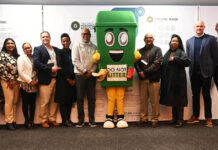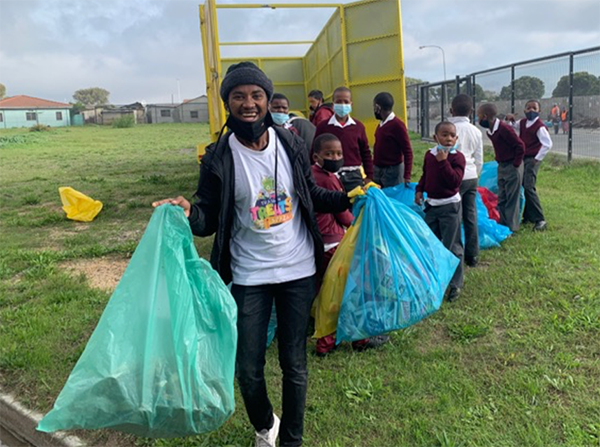Six Western Cape Schools receive part of R100 000 in cash for collecting recyclable waste
TRASH4TREATS, in partnership with MetPac-SA, the Producer Responsibility Organisation (PRO) that represents the metal packaging recycling industry in South Africa, has announced the names of the six Western Cape schools who received their part of the R100 000 cash prize for participating in the exciting schools recycling programme that was launched in 2019. To create excitement, schools competed against one another to collect the most sorted recyclable waste per capita. Dietrich Mor Primary School in Highlands Estate, Phillipi, collected the most recyclables and won R40 000 towards school upgrades. Linge Primary School in Nyanga received R30 000, followed Mkhanyiseli Primary School who received R15 000 and Luzuko Primary (Gugulethu), Siyazingisa Primary (Guguletu) and Isikhokelo Primary School (Ikwezi Park) who each received R5 000.
According to Kishan Singh, CEO of MetPac-SA, South Africa’s metals packaging collection rate has consistently been one of the highest of all packaging streams, sitting at approximately 65 % for the past few years. However, the industry has set itself the task of increasing this figure to 71 % within the next few years. For this reason, it is important for the metal packaging industry to target schools with the message about the importance of recycling and their contribution towards building a circular economy.
“Approximately 11% of the waste that was collected with the Trash4Treats campaign consisted of valuable metal packaging such as beverage cans, canned food, foil containers and aerosol canisters. MetPac-SA was privileged to be part of the Trash4Treats programme which successfully reached very important demographics of our target audience, namely primary school children, their parents, educators and the surrounding communities in under-resourced areas with the message that waste has value. These neighbourhoods got to experience the principles of a circular economy in a practical and immediate way, while post-consumer packaging that might have ended up in landfill or the environment, generated much-needed funds for the schools,” Kishan said.
Developed and implemented by [dot]GOOD, South Africa’s leading cause-marketing agency, the Trash4Treats campaign sent a team of educators and a mascot, called Trashy, to thirty participating schools in the Western Cape for in-person activation days. During this fun-filled and exciting visits, the team explained the value of waste and the importance of recycling. In addition, each school received educational posters, specially branded large collection bins, and bulk bags to aid in their ongoing collection efforts. Trash4Treats also connected the participating schools with local waste collectors who bought back the collected materials at the going rate, thereby helping to form a mutually beneficial and sustainable relationship between the school and the waste entrepreneur that benefits the whole community.
Proof of the success of this campaign can be seen in the fact that the Trash4Treats project engaged with over 32 000 students and collected over 55 tons of recyclable waste over the past twelve months.
There are multiple benefits that this intricately woven relationship established between the project developers, schools, the learners, their immediate community and waste management companies offered, namely:
- Environmental benefits: including less waste being sent to landfills, post-consumer packaging actively being recycled, and learners being educated on the negative impact that litter and waste have on the environment by them playing an active role in the removal of the waste and litter.
- Social benefits: notable upliftment of communities by the stakeholders involved, improved facilities in and around the schools in which the initiative was rolled out, and general upliftment of social behaviour in these communities.
- Economic benefits: an increase in job creation, new avenues for waste entrepreneurs that were established, and experiencing the financial benefits of a circular economy firsthand.
Concludes Kishan: “Our goal with this project was to make the learners and the surrounding communities realize the value that is locked in waste. We were able to inspire and educate our youth about the recyclability and value of metal packaging in addition to providing them with an incentive and a goal to work towards. By involving a large number of learners, we were able to divert an impressive amount of recyclable waste from landfill. This unique, hands-on approach created something bigger for them to be a part of and will leave a lasting legacy for their school for many years to come”.
For more information visit www.metpacsa.org.za or www.trashfortreats.com















